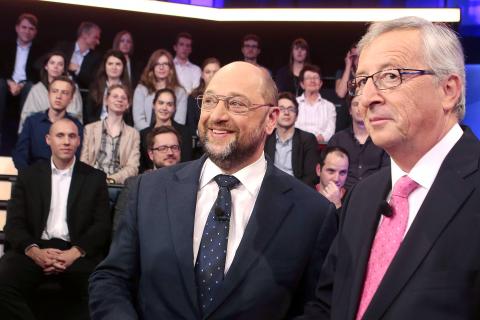France’s economic woes are the result of poor policy choices at home and Paris should stop blaming its problems on the strength of the euro, center-right candidate for European Commission president Jean-Claude Juncker told reporters in an interview.
The former prime minister of Luxembourg and long-time head of the Eurogroup forum of eurozone finance ministers spoke days after French Prime Minister Manuel Valls described the strong euro as a threat to French economic growth and jobs.
Valls, a Socialist, urged the European Central Bank (ECB) to adjust policy to weaken the single currency, which reached a two-and-a-half year high just below US$1.40 on Thursday before comments from ECB President Mario Draghi pushed it lower.

Photo: EPA
France, the second biggest economy in the eurozone, has been dogged by high unemployment and weak growth, casting doubt on its ability to meet EU-mandated deficit targets.
The economic weakness was behind French President Francois Hollande’s decision to reshuffle his government last month, bringing in Valls.
“I don’t believe France is the sick man of Europe,” Juncker said after an EU election campaign appearance in Berlin on Thursday. “But I do caution against looking for the causes of what is partly the result of [its] own mistakes somewhere other than at home.”
Juncker, 59, said the strong currency had created problems for a number of eurozone member states, but that its level was the same for all.
“If France has a tougher time than other countries, then the reasons for this are to be found in France, not in exchange rates,” he said.
Speaking earlier, Juncker suggested that the German economy was doing better than France’s because it was run by a center-right leader.
Juncker is the lead candidate for the European People’s Party (EPP) in scheduled May 25 elections for the European Parliament. His main rival for the presidency is Social Democrat Martin Schulz, a German.
In comments that may be more warmly received in France, Juncker also backed the idea of European “industrial champions,” saying governments should use planemaker Airbus SAS as a model in promoting tie-ups across other sectors.
In the past weeks, the French government has intervened to prevent US conglomerate General Electric Co from taking over the energy assets of French rival Alstom SA, by encouraging Germany’s Siemens AG to make a counter-bid.
Paris has argued that a transaction with Siemens has the potential to create two European champions — one in energy, the other in trains. However, Alstom’s management would clearly prefer to sell to GE, and Siemens seems lukewarm on the idea of a deal.
In the interview, Juncker defended the right of governments to intervene in corporate deals that affect their interests, describing Airbus — the Toulouse-based commercial jet manufacturer created by France and Germany as a rival to Boeing Co — as a success story to be copied.
“When the opportunity presents itself to put a [national] champion on a broader footing, we should try to launch European champions,” Juncker said. “Governments shouldn’t decide for companies, but governments have an interest and a right to be part of such decisions.”

US sports leagues rushed to get in on the multi-billion US dollar bonanza of legalized betting, but the arrest of an National Basketball Association (NBA) coach and player in two sprawling US federal investigations show the potential cost of partnering with the gambling industry. Portland Trail Blazers coach Chauncey Billups, a former Detroit Pistons star and an NBA Hall of Famer, was arrested for his alleged role in rigged illegal poker games that prosecutors say were tied to Mafia crime families. Miami Heat guard Terry Rozier was charged with manipulating his play for the benefit of bettors and former NBA player and

The DBS Foundation yesterday announced the launch of two flagship programs, “Silver Motion” and “Happier Caregiver, Healthier Seniors,” in partnership with CCILU Ltd, Hondao Senior Citizens’ Welfare Foundation and the Garden of Hope Foundation to help Taiwan face the challenges of a rapidly aging population. The foundation said it would invest S$4.91 million (US$3.8 million) over three years to foster inclusion and resilience in an aging society. “Aging may bring challenges, but it also brings opportunities. With many Asian markets rapidly becoming super-aged, the DBS Foundation is working with a regional ecosystem of like-minded partners across the private, public and people sectors

BREAKTHROUGH TECH: Powertech expects its fan-out PLP system to become mainstream, saying it can offer three-times greater production throughput Chip packaging service provider Powertech Technology Inc (力成科技) plans to more than double its capital expenditures next year to more than NT$40 billion (US$1.31 billion) as demand for its new panel-level packaging (PLP) technology, primarily used in chips for artificial intelligence (AI) applications, has greatly exceeded what it can supply. A significant portion of the budget, about US$1 billion, would be earmarked for fan-out PLP technology, Powertech told investors yesterday. Its heavy investment in fan-out PLP technology over the past 10 years is expected to bear fruit in 2027 after the technology enters volume production, it said, adding that the tech would

YEAR-END BOOST: The holiday shopping season in the US and Europe, combined with rising demand for AI applications, is expected to drive exports to a new high, the NDC said Taiwan’s business climate monitor improved last month, transitioning from steady growth for the first time in five months, as robust global demand for artificial intelligence (AI) products and new iPhone shipments boosted exports and corporate sales, the National Development Council (NDC) said yesterday. The council uses a five-color system to measure the nation’s economic state, with “green” indicating steady growth, “red” suggesting a boom and “blue” reflecting a recession. “Yellow-red” and “yellow-blue” suggest a transition to a stronger or weaker condition. The total score of the monitor’s composite index rose to 35 points from a revised 31 in August, ending a four-month